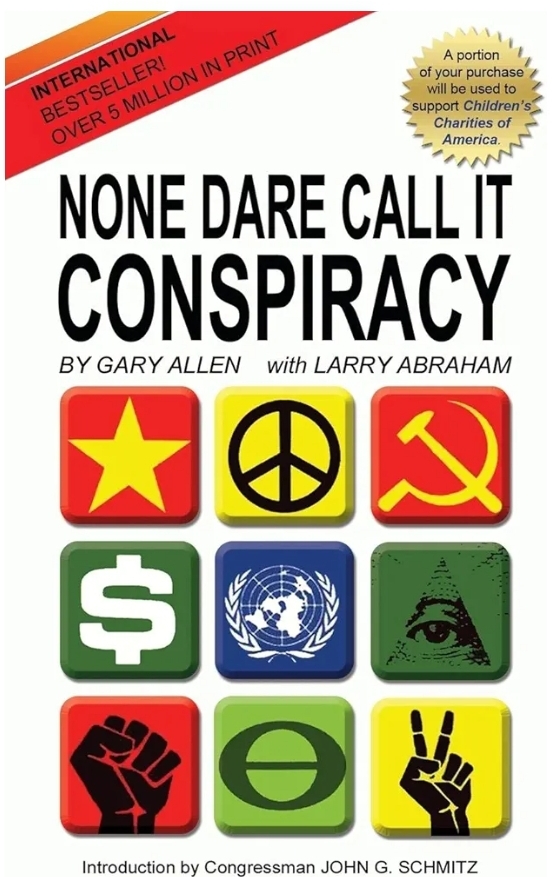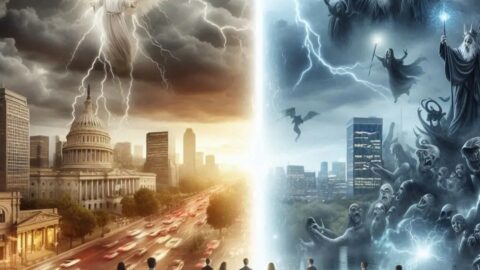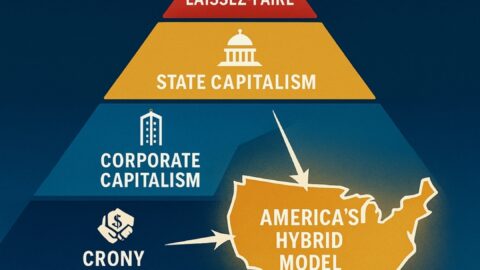Authors note: In the 1990s I came across this book by a mentor trying to show me what was happening in our country. Once you see it, you can’t unsee it. This was a key book to help see the bigger picture. It was a companion to Tragedy and Hope: A History of the World in Our Time (and The Naked Capitalist, which is a summary with Dr. Quigley’s quotes from Tragedy and Hope).
“None Dare Call It Conspiracy” by Gary Allen, first published in 1971, is a controversial political book that claims a small group of elites are orchestrating global events to achieve a one-world government. Allen argues that powerful financial interests, often referred to as the “Establishment,” manipulate political and economic systems to serve their own agenda, which he describes as a conspiracy to undermine national sovereignty and individual freedoms.
Key Themes and Arguments:
- Existence of a Global Conspiracy:
- Central Thesis: Allen’s primary assertion is that a small, secretive group of powerful individuals—comprising bankers, industrialists, and politicians—are working together to control the world’s political and economic systems. He claims this group operates through organizations such as the Council on Foreign Relations (CFR), the Trilateral Commission, and the Bilderberg Group.
- Motivation: The book argues that this elite group is motivated by a desire for wealth, power, and the establishment of a one-world government. According to Allen, they aim to replace national governments with a global government that they control.
- Role of Banking and Finance:
- Manipulation of the Economy: Allen posits that international bankers and financial institutions manipulate the economy for their benefit. He highlights how central banks, like the Federal Reserve, are allegedly used to control money supply, create economic crises, and consolidate power.
- Monetary Policy: He contends that monetary policies and practices—such as inflation, debt, and fiat currency—are tools used by these elites to impoverish citizens, make them dependent, and facilitate the transfer of wealth to a select few.
- Infiltration of Political Systems:
- Influence in Government: According to Allen, the elites have infiltrated governments worldwide, including the United States. They allegedly place their own members or sympathetic individuals in key positions within political institutions, influencing both domestic and foreign policy.
- Bipartisan Control: Allen argues that both major political parties in the U.S., the Democrats and Republicans, are under the influence of this cabal. He claims that party differences are superficial, serving to distract the public while policies that benefit the elite continue unabated.
- Media and Education as Tools of Control:
- Control of Information: The book suggests that mainstream media is heavily influenced or outright controlled by the conspirators to shape public opinion and suppress dissent. Allen believes the media plays a crucial role in promoting propaganda that aligns with the elite agenda.
- Education System: Allen also criticizes the educational system, arguing it has been subverted to indoctrinate young people with ideas that support globalism and socialism. He claims that traditional values are being undermined to create a more compliant, less critical citizenry.
- Historical Context and Alleged Evidence:
- Use of Historical Examples: Allen draws on historical events, such as the Bolshevik Revolution, the Great Depression, and World Wars, to argue that these were orchestrated or manipulated by the elite to advance their agenda. He also references economic theories like those of John Maynard Keynes, claiming that such frameworks were promoted to consolidate control over economies.
- Conspiracy and Documentation: He offers a mix of documented evidence, anecdotal stories, and interpretations to support his claims. However, critics argue that Allen’s evidence often relies on conspiracy theories, selective interpretation of facts, and tenuous connections.
- Call to Action:
- Public Awareness: Allen urges readers to wake up to the existence of this conspiracy and resist attempts to centralize power. He calls for the rejection of international organizations and treaties that he claims erode national sovereignty.
- Political and Economic Reform: The book suggests advocating for political candidates and policies that promote limited government, free-market economics, and a return to constitutional principles as a way to counteract the alleged conspiracy.
“None Dare Call It Conspiracy” is a polemical work that presents a narrative of global conspiracy involving powerful elites manipulating the world’s political and economic systems to achieve a one-world government. While it has garnered a following among those who are skeptical of globalism and centralized power, it has also been widely criticized for its reliance on conspiracy theories, lack of empirical evidence, and alarmist tone. The book remains a controversial text in political literature, appealing to those who are concerned about government overreach and the influence of powerful interests on global affairs.







